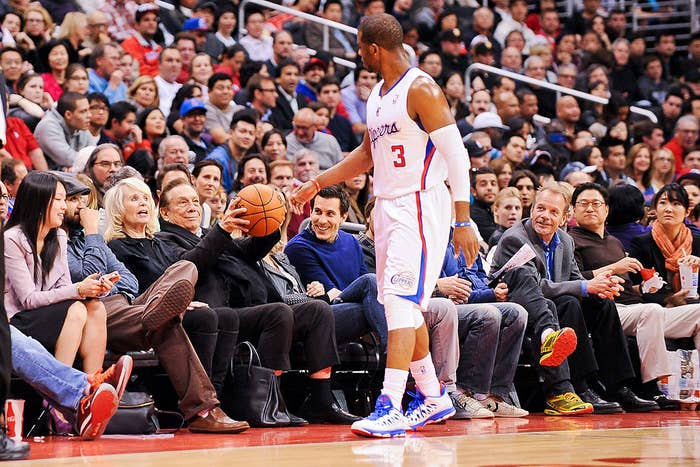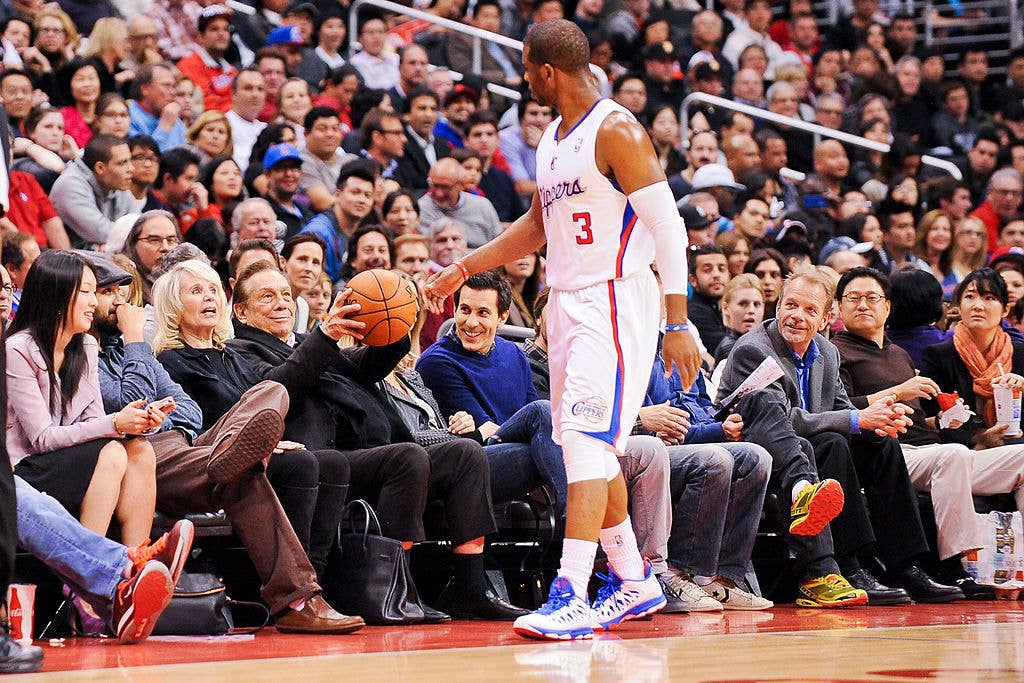
Everyone knew Donald Sterling was a racist. The world didn’t need the release of the infamous tape in 2014 that featured the former Clippers owner virulently ranting about how he hated that his former girlfriend, V. Stiviano, was “associating with black people” and “taking pictures with minorities.”
The slumlord billionaire who made his fortune in Los Angeles real estate had been accused plenty of times of being a racist before 2014. He’d been taken to court on multiple occasions and paid out settlements in the millions when he lost housing discrimination cases. Peruse through the court transcripts of those cases and you can read Sterling describe African-Americans and Latinos as “not desirable tenants.”
And, of course, there were the accusations leveled by NBA Hall of Famer and former Clippers general manager Elgin Baylor in 2009 in his wrongful termination lawsuit. After he departed from the organization he spent 22 years working for, Baylor said Sterling had a “vision of a Southern plantation-type structure” for his team. Baylor also accused Sterling of a “pervasive and ongoing racist attitude.” Baylor said Sterling preferred the Clippers be “composed of ‘poor black boys from the South’ and a white head coach.” It should be noted that Baylor would eventually drop the racial discrimination accusation in the lawsuit against Sterling, but Sterling's true colors had been exposed like never before.
Despite his abhorrent reputation, Sterling was never harshly punished or publicly humiliated for his detestable views. That changed when TMZ got hold of his hateful words and released them on April 26, 2014, just before Game 4 of the Clippers first-round playoff series with the Warriors. It was a bombshell that forever changed the NBA since Sterling was soon forced to sell the team and banned for life from the league and the crazy few days surrounding the controversy is laid out in a new documentary full of interesting tales and recollections from those who experienced it.
Debuting this week, Blackballed is the new 12-part documentary series from the streaming service app Quibi that looks back on how Doc Rivers and former members of the Clippers tried to navigate the 2014 NBA Playoffs while the loathsome Sterling twisted in the wind and dominated the national news cycle.
While much of the documentary won’t be revelatory to hardcore NBA fans, there are still plenty of incredible stories from the players who describe how nuts it was to play for a racist owner and how they came up with their powerful response.
Donald Sterling Didn’t Like White Players, Says Doc Rivers and JJ Redick
We’re all aware of Sterling’s hatred toward minorities. Apparently, he had a thing against white players, too.
Parts of this story have been widely reported and re-circulated last year when Clippers coach Doc Rivers revealed that in 2013 he quit the franchise for a brief period because Sterling wanted to back out of a deal that landed them JJ Redick.
Rivers and the rest of the Clippers thought they had added one of the NBA’s top sharpshooters in a sign-and-trade. It was going to be Rivers’ first free agent signing (four years and $27 million) and he was pumped. But after the coach closed Redick and landed back in Los Angeles, he had a “100 voicemails." Sterling, it turns out, was backing out of the deal.
“What happened was Donald Sterling woke up on July 4th, and at some point that day he said, ‘You know I think that’s too much money for a white guy,” Redick said.
In Sterling’s book, there was a stigma against white players. Didn’t matter if you could knock down threes like it was nothing or take off from the free throw line and dunk it.
“He didn’t like white players. And that was my first exposure to the race thing,” Rivers said.
Sterling Would 'Pet' the Players, According to Chris Paul
In the warped world of Sterling, he thought it was appropriate to pawn and pet his players like there were his animals.
Multiple former Clippers, like Chris Paul and DeAndre Jordan, tell stories about how handsy and awkward Sterling would behave around them before or after games at Staples Center. His handshakes would linger and he wouldn’t hesitate to run his hands up and down a player’s arm.
“It was almost like he would pet you,” Paul said.
Stories of Sterling entering the Clippers locker room with friends and marveling at “the beautiful black bodies” made waves when Baylor sued Sterling in 2009.
“He viewed NBA players as cattle,” ESPN’s Stephen A. Smith said.
Sterling was famous for throwing an annual white party in Los Angeles where he invited all kinds of friends and famous people to make himself feel like a big shot. He would also make sure his players were there for it since he loved to show them off to the largely white crowd. The Clippers were practically the only black people in attendance.
“We were there and Mr. Sterling was like showcasing us,” Paul said.
The Clippers Responded With the ‘Worst Press Release in Sports History’
In the immediate aftermath of the tape’s debut, the Clippers communications staff had to prepare a response. And instead of distancing the team and the players from the owner’s horrid comments, the organization at first questioned the validity of the tape.
“Mr. Sterling is emphatic that what is reflected on that recording is not consistent with, nor does reflect his views, beliefs, or feelings,” the statement read.
It was penned by former Clippers president Andy Roesner. Rivers was appalled.
“We had the worst press release in sports history,” Rivers said. “When it first came out it was more defending Donald Sterling. That was embarrassing.”
DeAndre Jordan Wanted to Boycott Game 4 and JJ Redick Immediately Joined In
When the tape released, the Clippers were on the road in the Bay Area. And nobody knew what kind of mood to expect in the locker room before Game 4.
When Rivers walked in to address his players and take the team’s temperature, he found a somber, despondent group sitting cross-armed in a pre-game meeting at the hotel. Some of the players were stewing. If they had any questions, Rivers said they should fire away.
“I couldn’t hide my face,” Jordan said. “So Doc says, ‘What’s going on with you, DJ?’ Talk to us. What’s going on? Well, I said, ‘I don’t want to play. I’m not playing tonight.’ Immediately, like, a lot of the other guys were in agreeance to that.”
Jordan knew had struck the right tone when Redick joined in without hesitation.
“He’s the whitest dude on our team and even he was the guy, like, ‘Yeah, DJ, fuck that, I’m not playing neither,’” Jordan said.
Redick became emotional hearing his black teammates, including Blake Griffin, air their grievances with the idea of playing another game for Sterling.
“When those guys started talking about their dads and their brothers and their kids, and you realize just how raw this emotion was, looking back at that meeting I’m still getting chills thinking about it,” Redick said.
Rivers Was Behind a Boycott
As the pre-game meeting at the hotel wore on, Rivers took control and leveled up with his players.
“I remember saying, ‘Ok, my name is Glenn Rivers. I’m from Maywood [Illinois]. I’m black,” Rivers said. “And if any of you think you’re more pissed than me you gotta be fucking kidding me. You don’t want to play we won’t play. Having said that, when I was a kid, growing up, and I said that I wanted to win a world championship, I never in my dreams said I want to win one for Donald Sterling. I want to win one for me.”
The Clippers, while outraged and distracted from an important game with the Warriors, began to rally around Rivers and one another.
“Right from the jump Doc handled it great,” Matt Barnes said. “He really let us express within that little meeting how he felt, what we thought. But he also reminded us of the task as hand and whatever he did as a group we needed to do it together.”
The players decided against forfeiting the game—they wanted to play and didn’t want to throw in the towel and give the Warriors a huge advantage, according to Paul. But the Clippers had another idea in store to make a powerful statement because, as Paul said, there was “pressure” to do something.
The Players Couldn’t Believe Sterling Was There to Greet Them Before the Game
Sterling rarely, if ever, attended road games when he owned the Clippers. But mere hours after the tape went viral there he was in the team’s hotel lobby, waiting to greet the players after they wrapped up their meeting. Nobody could believe it.
“When we left the meeting and decided we were going to play, we’re leaving the breakfast room and right before you get the elevators, Sterling’s in the lobby right there,” Jordan said. “I bullshit you not. Like, ‘Hey guys. How are you? Are you ready to play tonight? Are you ready?’ I’m like, ‘What the fuck is this guy doing in here?’ That’s how I knew like something was wrong with him because I don’t even think this dude knows what he said was fucked up.”
Rivers described the whole situation before the game as “nuts.” It was exacerbated when he learned Sterling was planning on attending the game. His seats would be directly across from the Clippers bench and Rivers couldn’t believe he would have the audacity to show up.
Meanwhile, in the hours and minutes leading up to tip, his players were thinking about everything but the Warriors.
It was Matt Barnes’ idea for the Clippers to Take off Their Warmups at Halfcourt
Even though many didn’t feel like playing, the Clippers decided as a group to soldier on. Everyone looked and acted normal as they left the locker room, gathered in a huddle inside the hall of Oracle Arena, and then ran onto the floor. An audience of thousands on hand and millions at home were waiting to see what kind of statement the players would make.
“We knew we had to show that we were united as a team, but still let everyone else know we understand the magnitude of what’s going on,” Barnes said. “What can we do as a team to show the country that we’re with them? I don’t know if it was in the locker room when I came up with it, but we came up with it at some point. When I said it, everyone was down for it. Everyone went with it.”
So what did they do? The Clippers gathered at center court and took off their warmup tops and placed them in a pile. Underneath, every player was wearing an inside-out t-shirt so no Clipper branding could be seen above the waste.
“We honestly didn’t want to represent the Clippers. We wanted to represent the 14 guys on that team,” Jordan said.
“It was subtle, but it was powerful,” Redick said. “It was a ‘fuck you’” to Sterling.
While Jordan wished the players could’ve done more, he said it was the best message they could send under the circumstances to let everyone watching know that the players had each other’s back.
NBA commissioner Adam Silver, who was in attendance, thought it was an appropriate statement to make.
“I respected them for doing that,” Silver said. “They found a symbol that didn’t interfere in any way with the operation of the game, that didn’t change the competitive landscape in any way, but was clear indication that something was different.”
The Clippers Knew They Were Going to Get Destroyed in Game 4
As opening tip rapidly approached and Rivers zeroed in on Sterling’s seat, wondering if he would have the audacity to show, the coach knew his squad was about to get trounced.
“We're going to lose by 50 tonight,” Rivers remembers.
Jordan thought the game would go one of two ways—either the Clippers would be so united they would destroy the Warriors or Golden State would annihilate LA. Either way, he knew the game wasn’t going to be close.
“And it wasn’t,” he said.
The Warriors blitzed the Clippers 118-97 to even the best-of-seven series at two games apiece.
“They beat the shit out of us,” Barnes said. “We should've forfeited the game.”
“There was no way our guys could emotionally play in that game,” Rivers said.
Four days after the tape’s release, in a press conference held in New York, Silver announced that Sterling was fined $2.5 million, banned for life from the NBA, and hinted that he expected the league’s other 29 owners to support a motion to remove him from the league. The Clippers would take the first-round series in seven games only to fall in six to the Thunder in second-round.

